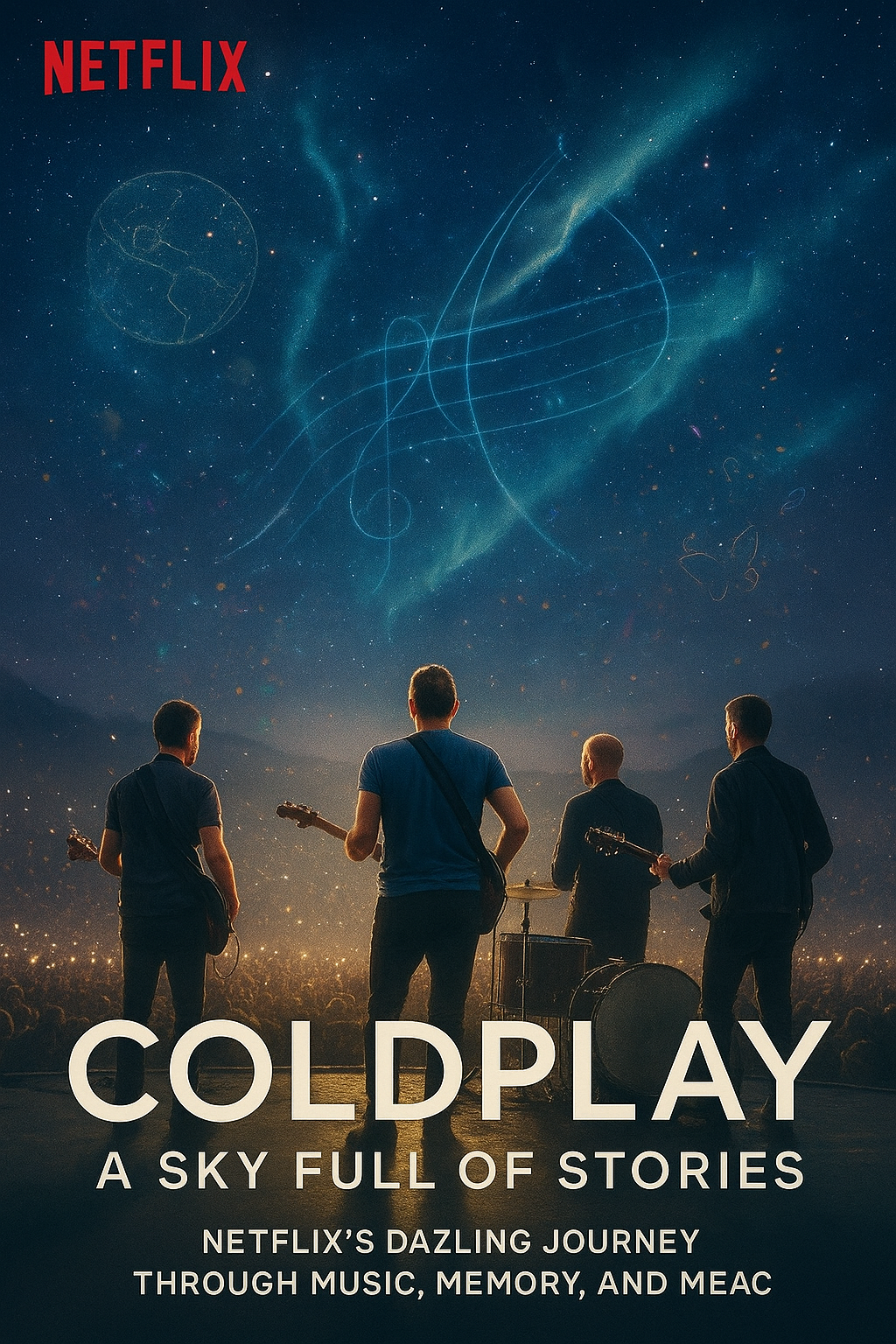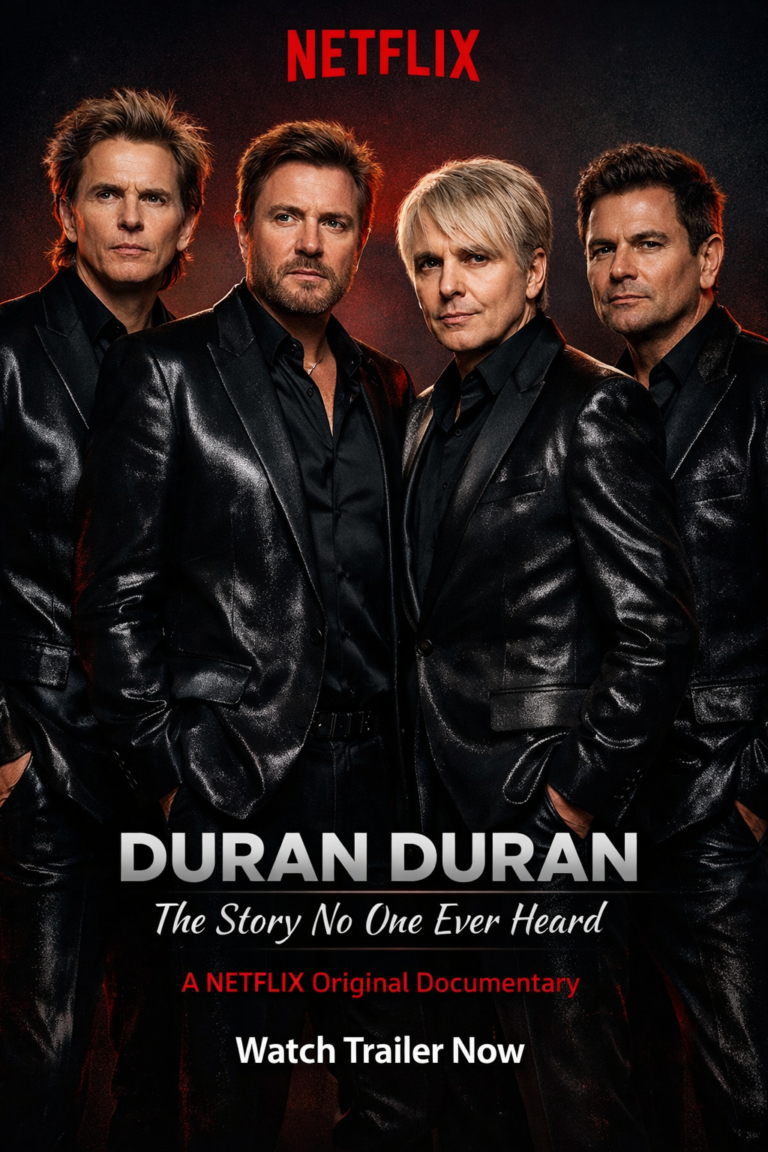
Netflix’s new documentary series on Coldplay is a sweeping, emotional, and beautifully crafted chronicle of one of the most influential bands of the 21st century. From their humble beginnings in university dorm rooms to headlining the biggest stages on Earth, the series takes viewers on a vivid journey through Coldplay’s creative evolution, personal struggles, and enduring message of unity. The show feels like more than just a retelling of a musical story—it’s a meditation on art, resilience, and connection in a rapidly changing world.
The documentary opens with the band’s earliest years at University College London, where Chris Martin and Jonny Buckland first bonded over their shared love of melodic songwriting. Archival footage shows the pair performing acoustic sessions in cramped rooms, dreaming of something far bigger than themselves. Soon after, Guy Berryman and Will Champion joined, completing a lineup that would go on to define a generation’s sound. The first episode grounds the viewer in the innocence and optimism that drove their debut album Parachutes.
As the series progresses, Netflix dives deep into the making of A Rush of Blood to the Head, the record that catapulted Coldplay from indie darlings to global superstars. Studio sessions are shown intercut with scenes of packed arenas and interviews with producers like Ken Nelson and Rik Simpson. Chris Martin’s songwriting process is depicted with unflinching intimacy—his handwritten notes, his voice breaking during takes, and his constant quest to balance vulnerability with grandeur.
One of the standout themes is Coldplay’s willingness to evolve. The third episode explores the sonic transformation brought on by Viva La Vida or Death and All His Friends, with commentary from Brian Eno, who pushed the band to embrace experimentation. Viewers see moments of creative friction, doubt, and breakthrough, culminating in one of the band’s boldest and most universally acclaimed records. The visuals are lush, filled with warm tones and surreal animations that mirror the album’s spirit of reinvention.
Throughout the series, Netflix intertwines the band’s music with the world events that shaped their perspective—wars, social movements, and environmental crises. Coldplay’s activism is given honest treatment; the filmmakers show not only the band’s philanthropic commitments but also the criticism they’ve faced for balancing advocacy with commercial success. The documentary’s candor makes it feel real rather than idealized, a refreshing departure from the glossy image often associated with music documentaries.
In later episodes, the focus turns to the band’s creative process during the making of Everyday Life and Music of the Spheres. Audiences are shown an older, more reflective Coldplay—still driven, but now more comfortable with imperfection. Chris Martin speaks openly about self-doubt and the challenge of maintaining artistic sincerity in a world dominated by algorithms and trends. The emotional core of these episodes lies in how the band continues to seek connection through music even after decades in the spotlight.
Cinematographically, the documentary stands out for its visual poetry. The directors employ time-lapse cityscapes, surreal transitions, and fan-submitted concert footage that captures Coldplay’s ability to unite diverse audiences. The use of drone shots over glowing stadium crowds conveys the scale of their reach, while close-up shots of the band’s quiet moments backstage reveal their human side. Every episode is underscored by reimagined versions of their songs, blending nostalgia with reinvention.
Netflix’s production team deserves special credit for the series’ pacing and tone. Rather than a linear biographical format, the episodes move like a symphony—each section building emotional resonance, exploring new layers of sound and spirit. Interviews with longtime collaborators, family members, and fans from across continents give the show a global, inclusive atmosphere befitting Coldplay’s ethos. The result feels both deeply personal and universally relatable.
A particularly moving segment occurs when the band revisits the site of their first performance. Old friends and mentors recount the naivety and ambition of four young men who had no idea they would one day become cultural icons. That reunion, captured with understated tenderness, becomes a metaphor for the entire series—a reminder that greatness often begins with friendship and a shared dream.
On October 10, 2025, Netflix officially released Coldplay: A Sky Full of Stories, the six-part documentary series directed by Asif Kapadia. Early reviews praised its emotional depth, cinematic flair, and honesty. Critics noted that while the series celebrates Coldplay’s success, it never shies away from portraying the band’s growing pains, creative disagreements, and existential reflections on fame. It quickly became one of Netflix’s most-watched music documentaries of the year.
The final episode closes with the band performing Fix You in São Paulo, under a sky lit by fireworks and the glow of tens of thousands of phones. As the crowd sings in unison, Chris Martin pauses to reflect on the passage of time and the privilege of connection through music. His words—“We’re all part of the same song”—resonate as the series fades to black, leaving viewers with a feeling of warmth and collective belonging.
Ultimately, Netflix’s Coldplay documentary succeeds because it’s not just about a band—it’s about people searching for meaning, community, and light. Whether you’re a lifelong fan or a casual listener, the story feels deeply human. It captures why Coldplay’s music endures: it speaks to the heart, transcending trends and generations. In documenting their journey, Netflix has created more than a retrospective; it has crafted a love letter to hope itself.


